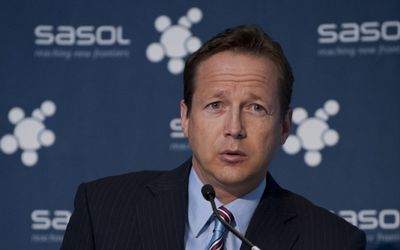Sasol delays operations at US units by a year to 2019
by Paul Burkhardt,
2016-03-07 17:56:10.0
SASOL will review the cost and timing of its $8.9bn chemicals plant in the US, as slumping prices caused first-half profit at the world’s biggest producer of motor fuel from coal to drop 63%.
Some units converting ethane into plastics and other products at Lake Charles in Louisiana will start in 2019 instead of 2018, said Johannesburg-based Sasol, which aims to complete a review of the project by the middle of this year.
"There shouldn’t be a further slip unless we need to conserve more cash on the project and I don’t foresee that," CEO David Constable said on Monday.
Sasol increased cost-savings targets for the next three years after making cuts of R10.8bn in the six months to December 31. The company also took a R7.4bn impairment charge on its interests in Canada’s Montney shale-gas basin as it adjusts to lower crude and chemical prices.
"We’re being very conservative, so that allows us to protect the gearing, pay the dividend and make sure the credit rating stays where it is," Mr Constable said. Long term, Montney is a "great asset," he said.
Sasol increased its cash-savings range to R65bn to R75bn and by 2018 from R30bn to R50bn as Brent crude dropped an average of 47% in the first half from a year earlier, and a basket of commodity chemicals fell 23%.
While the price declines were partly offset by the rand’s weakening against the dollar, net income declined almost two-thirds to R7.3bn in the six-month period. Sasol declared an interim dividend of R5.70 a share, down from R7 a year earlier.
Sasol shares climbed 1% to R482.98 as at 4.33pm in Johannesburg, bringing this year’s gain to 15%.
Liquid fuels production rose 4% from a year earlier while volumes of base chemicals declined. Earnings excluding one-time items fell 24% to R14.8bn.
Sasol expects Brent to stay in a range of $25 to $40 a barrel, while margins for base chemicals will remain under pressure with lower sales volumes anticipated.
"Oil prices are currently subjected to sentiment-driven volatility and while some fundamentals indicate that the oil-industry cycle is poised to turn, it remains difficult to determine when this will happen," Sasol said.
Sasol last year delayed a decision on whether to build a gas-to-liquids plant in the US, which would have cost as much as $14bn. Mr Constable said there was still potential for such plants when oil prices rebound, citing a possible expansion of the Oryx facility in Qatar should the nation make the gas available.
Bloomberg

Sasol CEO David Constable addresses the media on the group’s results in Rosebank in March 2013. Picture: MARTIN RHODES
SASOL will review the cost and timing of its $8.9bn chemicals plant in the US, as slumping prices caused first-half profit at the world’s biggest producer of motor fuel from coal to drop 63%.
Some units converting ethane into plastics and other products at Lake Charles in Louisiana will start in 2019 instead of 2018, said Johannesburg-based Sasol, which aims to complete a review of the project by the middle of this year.
"There shouldn’t be a further slip unless we need to conserve more cash on the project and I don’t foresee that," CEO David Constable said on Monday.
Sasol increased cost-savings targets for the next three years after making cuts of R10.8bn in the six months to December 31. The company also took a R7.4bn impairment charge on its interests in Canada’s Montney shale-gas basin as it adjusts to lower crude and chemical prices.
"We’re being very conservative, so that allows us to protect the gearing, pay the dividend and make sure the credit rating stays where it is," Mr Constable said. Long term, Montney is a "great asset," he said.
Sasol increased its cash-savings range to R65bn to R75bn and by 2018 from R30bn to R50bn as Brent crude dropped an average of 47% in the first half from a year earlier, and a basket of commodity chemicals fell 23%.
While the price declines were partly offset by the rand’s weakening against the dollar, net income declined almost two-thirds to R7.3bn in the six-month period. Sasol declared an interim dividend of R5.70 a share, down from R7 a year earlier.
Sasol shares climbed 1% to R482.98 as at 4.33pm in Johannesburg, bringing this year’s gain to 15%.
Liquid fuels production rose 4% from a year earlier while volumes of base chemicals declined. Earnings excluding one-time items fell 24% to R14.8bn.
Sasol expects Brent to stay in a range of $25 to $40 a barrel, while margins for base chemicals will remain under pressure with lower sales volumes anticipated.
"Oil prices are currently subjected to sentiment-driven volatility and while some fundamentals indicate that the oil-industry cycle is poised to turn, it remains difficult to determine when this will happen," Sasol said.
Sasol last year delayed a decision on whether to build a gas-to-liquids plant in the US, which would have cost as much as $14bn. Mr Constable said there was still potential for such plants when oil prices rebound, citing a possible expansion of the Oryx facility in Qatar should the nation make the gas available.
Bloomberg




















Change: -0.47%
Change: -0.57%
Change: -1.76%
Change: -0.34%
Change: 0.02%
Data supplied by Profile Data
Change: -1.49%
Change: 0.07%
Change: -0.47%
Change: 0.00%
Change: 0.04%
Data supplied by Profile Data
Change: 0.43%
Change: 1.19%
Change: 0.66%
Change: 0.15%
Change: 1.17%
Data supplied by Profile Data
Change: 0.06%
Change: -0.63%
Change: 0.00%
Change: -1.40%
Change: -0.87%
Data supplied by Profile Data